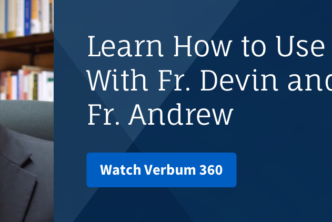I’ve recently been reading Erik Peterson’s The Book On the Angels: Their Place and Meaning in the Liturgy and have been wondering what kind of information we might find when looking for “angels” in Verbum. Peterson’s thesis runs:
“…if the Church has left the early Jerusalem and its Temple and is now on its way toward the heavenly Jerusalem and its temple, it will necessarily also meet with the residents of the heavenly city, those of whom Hebrews speak: angels, citizens of heaven… all cultic acts of the Church would thus either be a participation of the angels in the earthly cult, or… all earthly worship by the Church would be understood as participation in the worship that the angels offer to God in heaven.”
Peterson goes on to explore the merits of this thesis looking at Scripture and Tradition. Let’s see what research we can dig up on our own.
First, let’s start by simply typing “angels” into a search pane and open up the Cited By tool. Make sure the cited by tool is set to “Follow.” [Click on images to enlarge them]
I think it’s always helpful to start with Aquinas’ Summa, so let’s open it up and click the first result that we see, his Treatise on the Angels
To address Peterson’s questions about where and how we’ll be participating with the angels in the worship of God, Aquinas’s treatment of The Angels in Relation To Place seems like a good place to start.
Scrolling down to the first question, Whether an angel is in a place? We can see 20 references to the Summa in our entire library. This is a good start, but I want to see where else in my library Angels are mentioned, not just the Summa Theologica itself.
In order to see everywhere in my library that a specific section of the Summa is referenced without seeing the Summa’s self-references, let’s make a collection that includes everything in our library except the Summa.
Start by going to Tools > Collections. Let’s name this collection “-Summa.” In the “minus these resources” section place the Summa in both English and Latin. To make sure everything else in your library is in the collection, start with the rule “myrating:>=0”. All this does is make sure anything in your library with a rating greater or equal 0 (which is everything) is included.
Perfect. Now, when we look at the references to Summa in our Cited By tool, we find seven other hits outside of the Summa.
What we find is that most of these hits are from other resources that are actually analyzing the Summa itself, not just referencing it for the sake of original research. That’s OK—sometimes we hit “dead ends” when researching. But the good news is that since the Cited By tool is linked to the Summa, we can simply keep scrolling down to see what other references we have waiting in our library.
Eventually we reach the fourth article of question 62—Whether an angel merits his Beatitude? This question actually addresses head-on exactly what Peterson is looking into. Aquinas states:
…It is stated (Apoc. 21:17) that the measure of the angel in that heavenly Jerusalem is the measure of a man. But man can only reach beatitude by merit. Therefore the same is the case with the angel.
This affirms Peterson’s thesis that both angels and humans participate in the celestial worship of God. But still, it looks like all of the references we have in the Cited By tool are to secondary and tertiary source materials analyzing the Summa itself.
At this point it might be a good idea to change our research tactic. We have some solid information backing up Peterson’s assertion and have even set up a rule that will help us find things in our library that aren’t the Summa while studying within it. Let’s leave the study for now, and maybe pick it up on a later day with a different angle.
Have any resources or ideas you want to share about how angels and humans participate together in the worship of God? Leave a comment below! Also, feel free to let us know how you use the Cited-By tool in your study.








